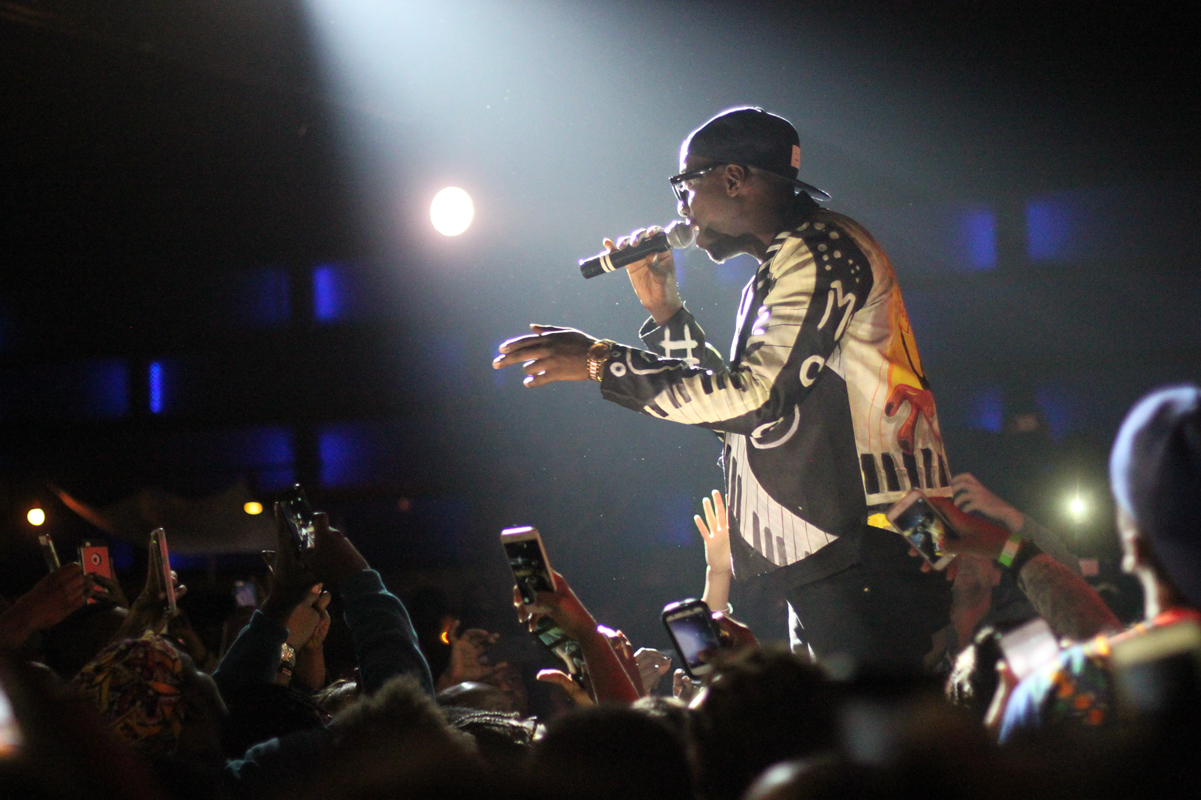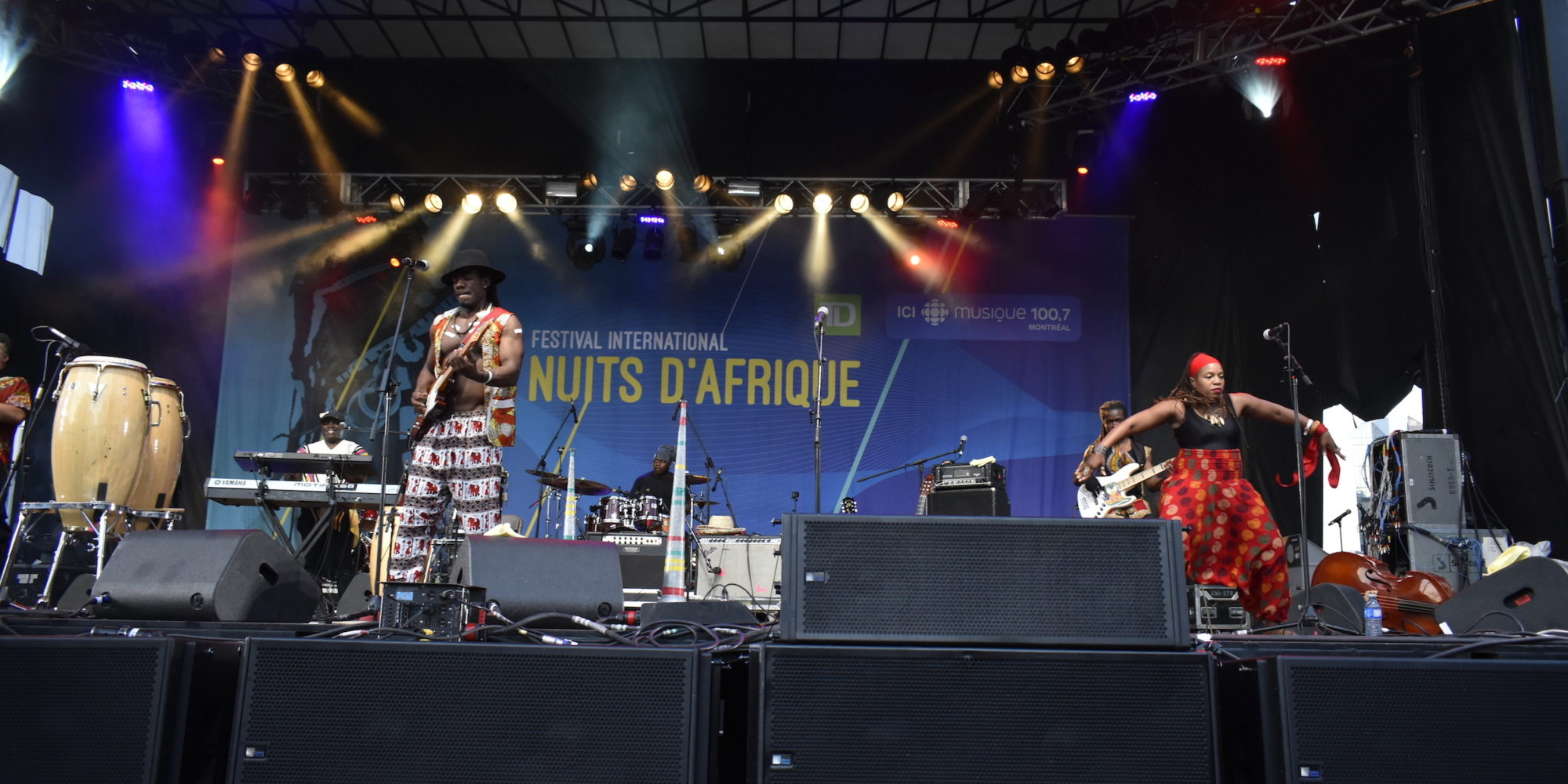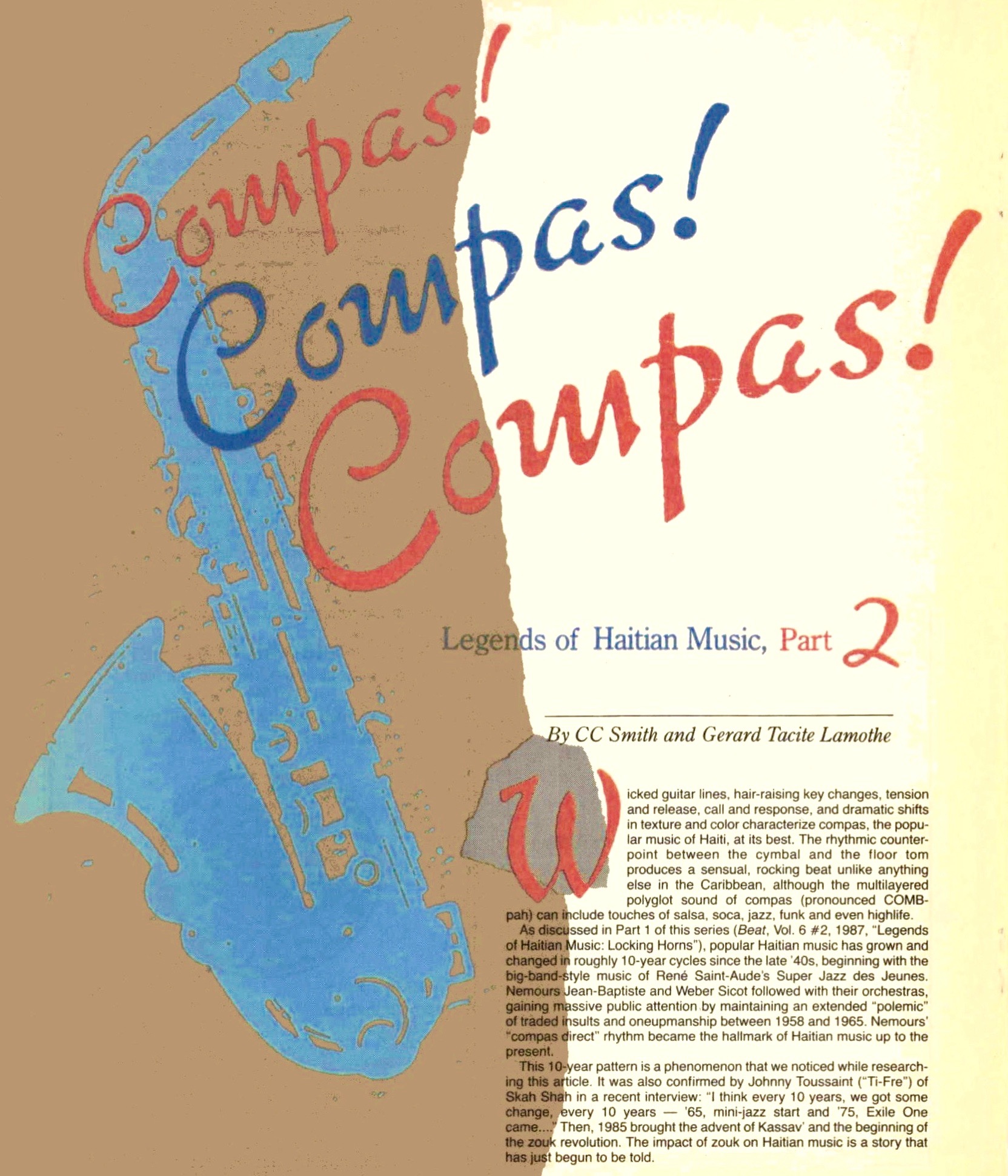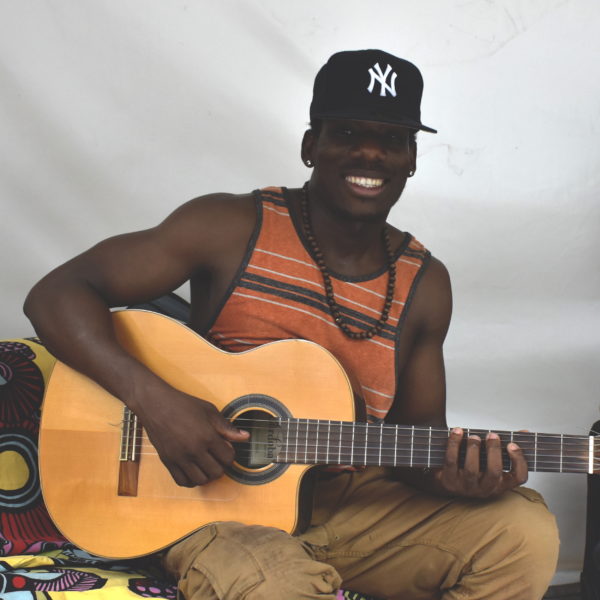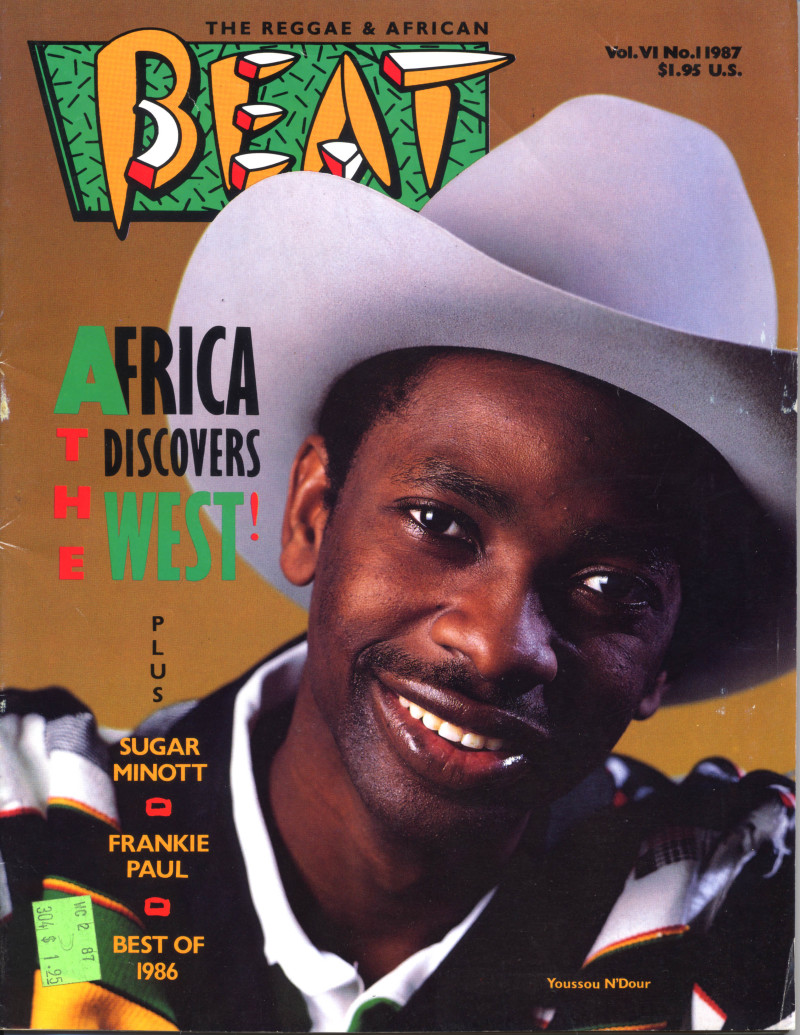The first time I saw Wesli, born Wesley Louissant, he was the touring guitarist for fellow Haitian-by-way-of-Montreal singer Emeline Michel, adding slick, West African guitar flourishes around Michel's vocal lines. Both artists are grounded in Haitian roots music but see Haiti as part of a bigger context. As Wesli's collaborations with fellow Haitian artists, Vox Sambou and Mikaben, and albums released under his own name demonstrate, you can bring in flavors from all over—West African guitars, sure, but also American jazz, reggae, contemporary Caribbean pop—without diluting your sound or losing your musical identity.
On his latest album, Wesli demonstrated that he doesn't even need a guitar to get his point across—the banjo has a lot to offer his Caribbean sound too. Haitian music, after all, is a mix, Wesli pointed out when I finally interviewed him. The record, Rapadou Kreyol, received the Juno award (the Canadian Grammy) for world music album of the year in 2019.
I sat down with Wesli the afternoon before his performance on the Festival Nuits d'Afriques main stage in his adopted home of Montreal, to find out how one grows up to be such an in-demand, and dynamic player—a jack-of-all-trades and a master of his own. He told me about building his own guitar out of an oil can, the records his dad would bring home from traveling, and about the free school he founded in Haiti in hopes of someday paying back, in some way, all that Haiti has given him.
Ben Richmond: Wesli, would you like to introduce yourself to the Afropop audience?
Wesli:Yes my name is Wesli. I'm an artist, auteur, composer from Haiti. My style is mostly world music. I can sing Caribbean and twoubadou mixed with world and African-Caribbean style, playing off world music. And I'm glad to be with you.
Thank you. Let's talk about your style. Growing up what were you listening to?
When I grew up in Haiti, I was listening to a lot of music. When I was a little boy, I grew up in church and then my dad was a twoubadou player. He was playing on the beach all the time, playing for the tourists. He was playing banjo and percussion with a trio called Trio Select [Editor’s note: Coupe Cloue’s group].
And I listened to that and started playing percussion for my dad when I was eight years old, nine years old. I'd shake this shaker because I grew up in a big family of seven children and my family had big problem: babysitting us. My dad would just to take me to the beach with him whenever I didn't have school and then we'd play music for the whole day. And after that, when I dedicated myself to music I was very open minded. I remember my dad gave me a vinyl of Fela Kuti, another vinyl of Wes Montgomery, and a bunch of different styles. He'd travel, and whatever he brought us, I'd listen to that. I became who am because I listened to all those people: I listened to Bob Marley a lot and Alpha Blondy, Lucky Dube and also King Sunny Ade and Fela Kuti and also Bembeya Jazz Orchestra from Guinea, and then all the griots. And there was another band again that was really important for me: Super Etoile de Dakar [Editor’s note: Youssou N'Dour's group]. My dad traveled to Cote d'Ivoire and he brought me that.
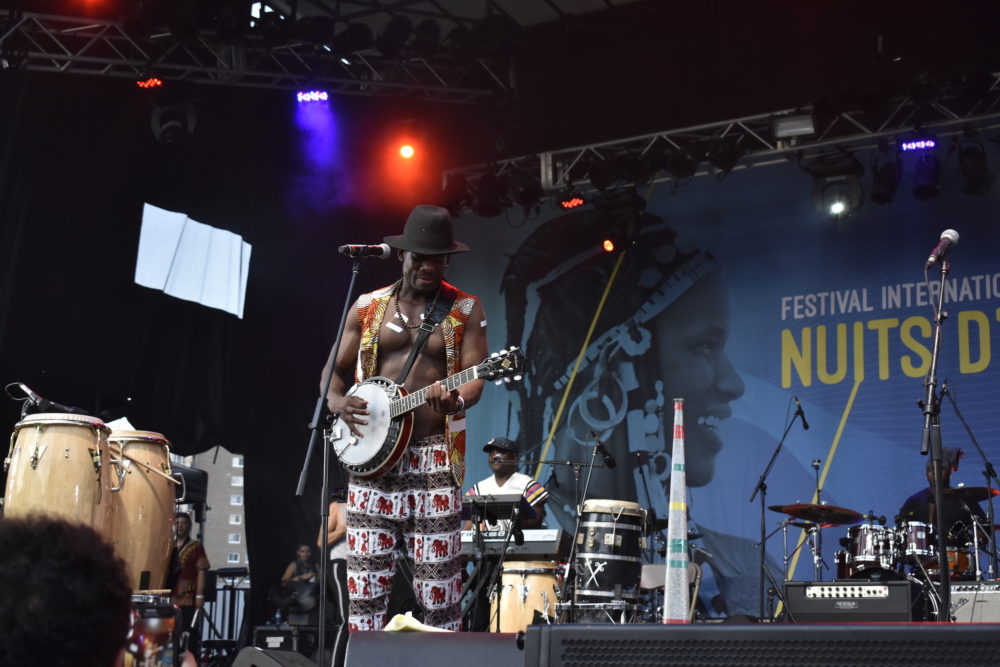
I was very happy to get those influences in, because my dad is really pan-African. He is really connected to Africa and he exposed me to all kinds of music—American music and also African music. I'd also keep up with church bands and all that.
I started singing seriously when I was 12 or 13 and playing guitar—touching a real guitar because my first guitar, I built it myself, because I could not touch my dad's guitar. I started singing in church and that's the way I suppose, I brought a bunch of other influences and gospel influence and Afrobeat in all their styles to the church, which was very refreshing.
And that's the way I feel my sound. That's because the Wesli sound is the kind of Afrobeat mix with our roots from Haiti and twoubadou from Haiti and the Caribbean side.
Being a percussionist very young, when you heard this African music, what was the first part that your ear was drawn to? Were you interested in the rhythm of it? Do you think that influenced how you heard it?
Oh yeah, it is very is very influenced. It's a very good influence for me just to be in percussion because the thing is, what happens in percussion, this is the very roots of the roots of the song. You know that's why if you look at my band, it's a mixture of music and percussion in very complex arrangement because I have listened to all kind of percussion, then I try to bring them to the instruments. Instruments can't really replace or imitate that very percussive sound completely but it gives another style of it and it becomes something very refreshing and very percussive and very rhythmic. And that makes the music move people more.
I guess Fela is a good example of that: Every instrument that's playing is a rhythm instrument. Even on the solos, they're played like drums a little bit, even if it's a saxophone. But when you heard Super Etoile de Dakar and then Bembeya Jazz National, could you hear a Cuban influence? You were living in the Caribbean at the time, did it seem familiar when you heard it?
Yes. It's very familiar. There's a very African style of guitar and African singing with a Cuban style because at that time there was the rumba. The rumba was very popular in the Caribbean and Africa. And then I did listen to a lot of rumba and at the same time too when I listened to Fela Kuti it reminded me of like Tropicana or any big orchestra in Haiti at that time. The Orchestre Tropicana d'Haiti is this orchestra that has, for years and years on since the '40s, been playing. And I was connected to Africa through those orchestras and the rumba and the Cuban style and twoubadou.
Because the twoubadou itself, after the colonization when Haiti got its independence, the twoubadou was going out of the culture. It was mostly the vodou culture that became forward. And that's because the twoubadou was a mixture of the slave with the masters together that play accordion and banjo from Europe, you know, and the slaves singing and playing percussion—that was their instrument. So when Haiti got its independence they got twoubadou off the radar—until the Haitians start going to Cuba and working in the sugar cane fields. Then they came back in Haiti at the end of 1800s with the twoubadou again, to bring it back again, to say "this is our style!" This is a mixture of the white European and the black African and the Caribbean colonial but they made it their own again.
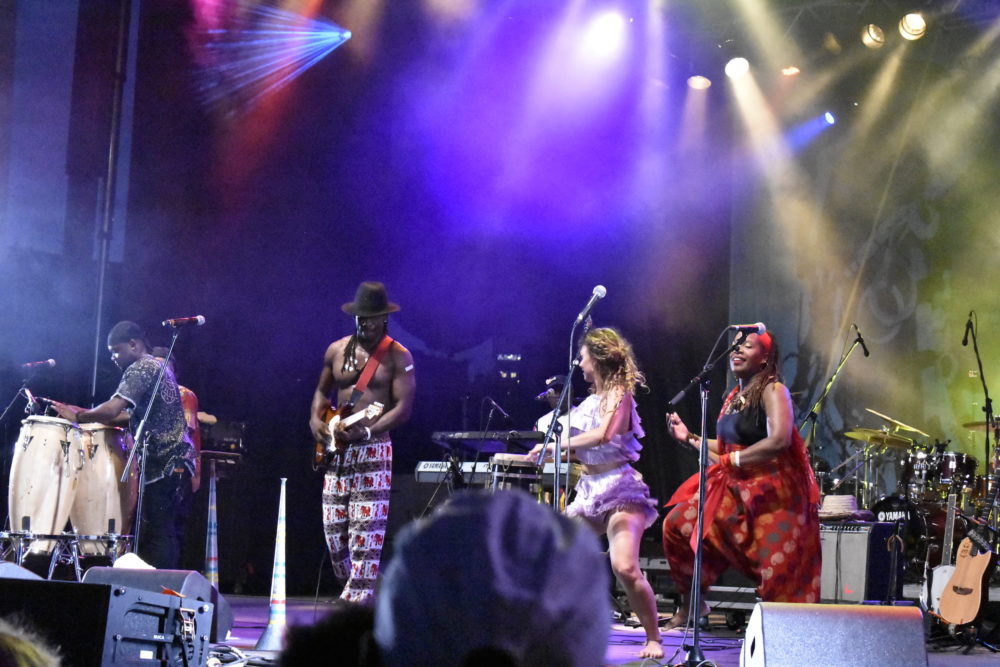
Yes. And then that's the way I was influenced by that. We had also the big orchestral acts that sound similar to Fela Kuti. They have a lot of brass—three saxophones, four trumpets and two trombones and everything. It made me like having this richness of instrumentation and complex song arrangements. And I was exposed to all that, because in their high school they didn't have any guitar in their high school, or any percussion. They put me on trombone. I played trombone in high school the whole time.
I don't think I've heard that on your records yet. You have so many styles that you incorporate into what you're playing. You said you'd been playing guitar since you were 12?
Yeah, I've been playing since I was nine. I built my own guitar when I was nine because the guitar of my dad was really a beautiful guitar. But he played it for a living. You know, we are seven children in the house and he has to provide schooling, food and everything, so it was very difficult to touch the guitar of my dad—he didn't want me to touch it because he said this is the guitar that brings food in the house. He hung it up, in the living room and I knew that I could not touch it.
It's tricky if it's for work. My dad never let play with our car.
I was very intrigued by the guitar so I went to the forest and I took a piece of wood and I took a knife and I worked the piece of wood and the frets and put the frets on and built my own. I took a big iron and put it on the fire, a very high fire and put it in there and created my own frets. I went into the street and I found an NGO oil can and then I took the empty oil can and I took my knife and just made a hole in it like the bottom of the guitar, like I'd seen. I went to the beach and some fisherman gave me some strings. They gave me the strings and when I get back home when the guitar is finished, I told my dad that ìI want to tune my guitar like yours. He tuned it for me and I started singing with him.
How did it how did it sound? How did it play?
It was really good in the beginning! You know I was a little boy, it was really good at that time. I remember I amplified it with a transistor from the radio. And I remember at the summer camp for children we played the whole camp for one month, we played and amplified it. My own guitar! And my brother made a bass like that from an NGO oil can and my other brother made a drum like that. The same way.
That's cool, do you guys have any recordings of that?
We don't have any recordings of that but we still have the instruments in the house in Haiti.
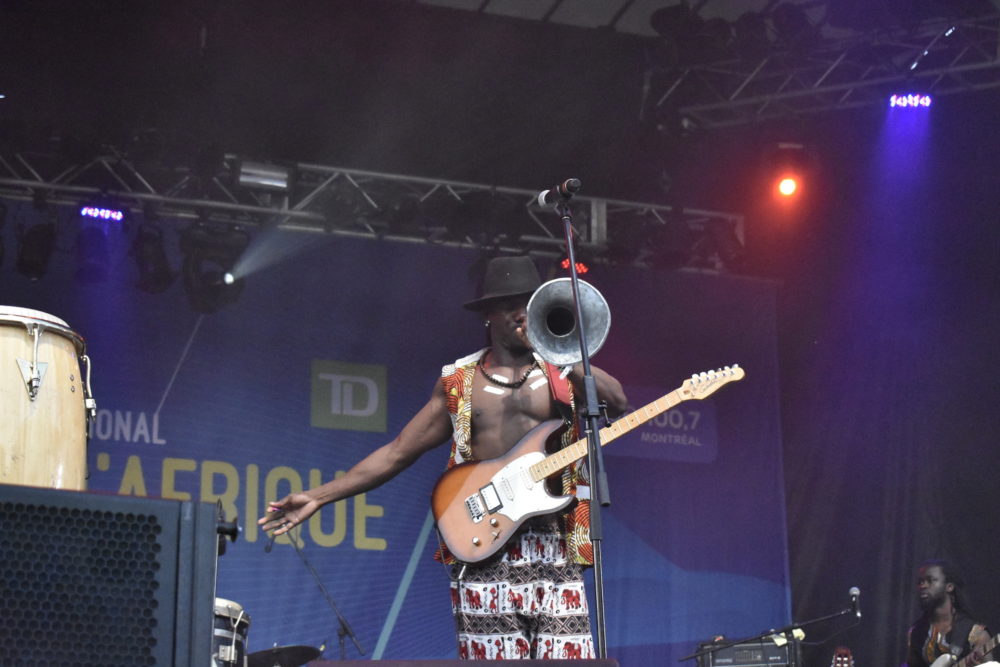
Education of young people has been a big part of your story since coming to Montreal. Can you talk a little bit about that?
Education for me is the best way to transfer the knowledge to the youngsters, you know? Haiti is a very fragile country in terms of education and in terms of employment. And I know the young, they need to have enough activities—but there was no money to give them activities.
Me, I was making my mind work and I found the best thing to do is to create a school, a free school for everyone between 10 and 15 to attend with no fee, where they could come to play and practice instruments, practice with their voice and do workshops with them. I have a couple of volunteer teachers heading to Haiti. Good musicians come to volunteer there and they help the youngsters to grow their talent.
I thought it was a very good idea to give Haiti back what Haiti gave me and all because if I'm here today, if I can play in front of many people, if I can do that many albums that I did—it's because of Haiti, because I have been exposed to knowledge I was exposed to, and to the influence of people who gave me the good influences and help me grow. I intend to do the same for the youngsters.
What do these kids want to hear or what do they want to learn how to play?
They get their choice—there's a lot of instruments at the school. There's piano, there is percussion. There was bass, there was drum and also there was guitar. They had different guitars: nylon guitar, classical guitar, electric guitar and there is also a vocal class; we have some rapping class as well. We give them hip-hop classes and dancehall classes. We tried to take them to the roots and teach them how to be good musicians.
Very cool. Is there any particular artist that they want to sound like? Like, “can you teach me how to play this Bob Marley song?”
They are really into Bob Marley and African influences. There was a lot who want to sing like Youssou N'Dour and there are some that want to sing like Bob Marley, like Jimmy Cliff, like Lucky Dube—as well as Tupac. I heard a lot of young telling me that they want to learn to rap.
And there are some as well that want to play guitar differently: They want to play jazz. They want to play soul music. They want to play Haitian music—the roots music.
Some percussionists, they want to play vodou music. I have to bring them to the vodou lakou just for them to listen to the right rhythms. and can play from the right understanding—they can start playing like that. They have so many influences they want to sound like. And I guess I wanna give them the freedom to choose to be the best musician that they can. And whenever they have to do their own career they can do whatever they want in the end.
You and Mikaben have collaborated, is that right?
Yes, I performed on his album and he performed also on my album. "J'ai Grandi Dans un Ghetto" [I Grew Up in the Ghetto] was a song we did in Haiti with the kids, especially the kids of my school. It's all about bringing the ghetto to the positiveness of life. When you hear about ghetto, you hear about violence you hear about bad people and pickpockets or whatever. But we did that song with the kids to inspire them and make them feel like they are part of this society, and they are part of the positivity of their society and can be useful. They have heroes who are like us, who chose a good way. They can choose also the good path for themselves. That was the subject of the song and then that was the branding behind the collaboration actually.
Where did you meet Mikaben? Was that here in Montréal?
No, we grew up together in Haiti. I remember meeting him when I was a teenager. At that time our parents wanted us to finish school and they didn't want us to go into music fully. But we did jam together when I was 14 or 13. And after that actually he moved to Montreal before me for school, so when I came to Montreal, I met him and we worked together.
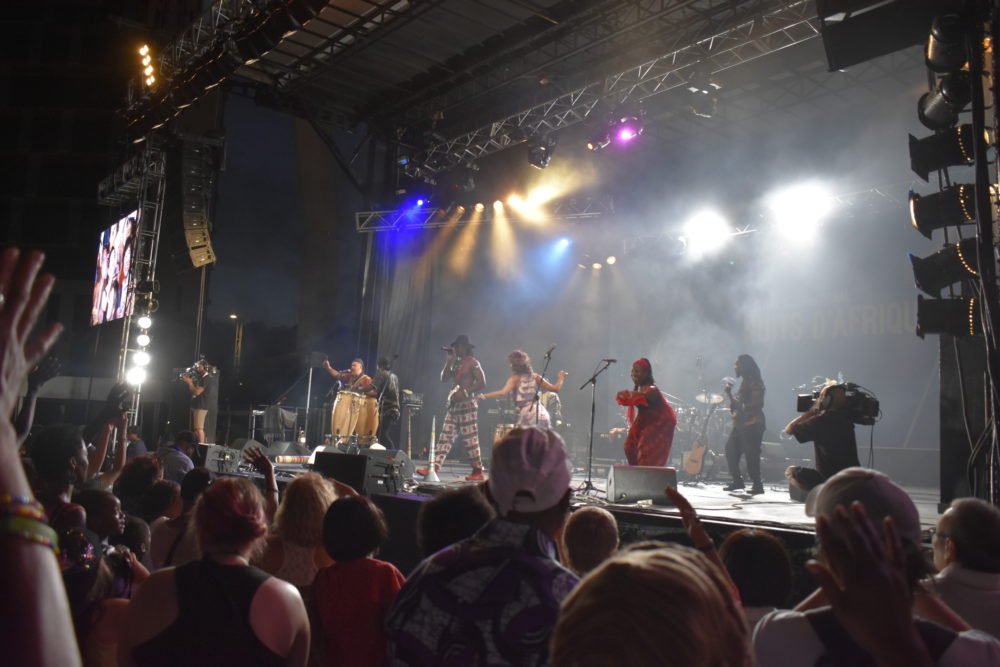
What do you think allowed you to become a very dynamic player?
The thing is, music is music. Music is a powerful weapon, music is a powerful tool against every badness. And music can bring good and more good in your life. Music is a very good thing to accept in your life, and make it part of your life. That's what I did when I was a teenager. Haiti is a very dangerous country to raise children. My parents didn't want me to get into badness and bad influences so they exposed me to all kinds of music. They made me spend all my time in school and music. And it was like I was sleeping since I was 10 and I wake up when I was 18—with a bunch of knowledge and a lot of influences.
That's the way music is always for me. Time to jam, time to be happy and jamming with different people.
Related Audio Programs
